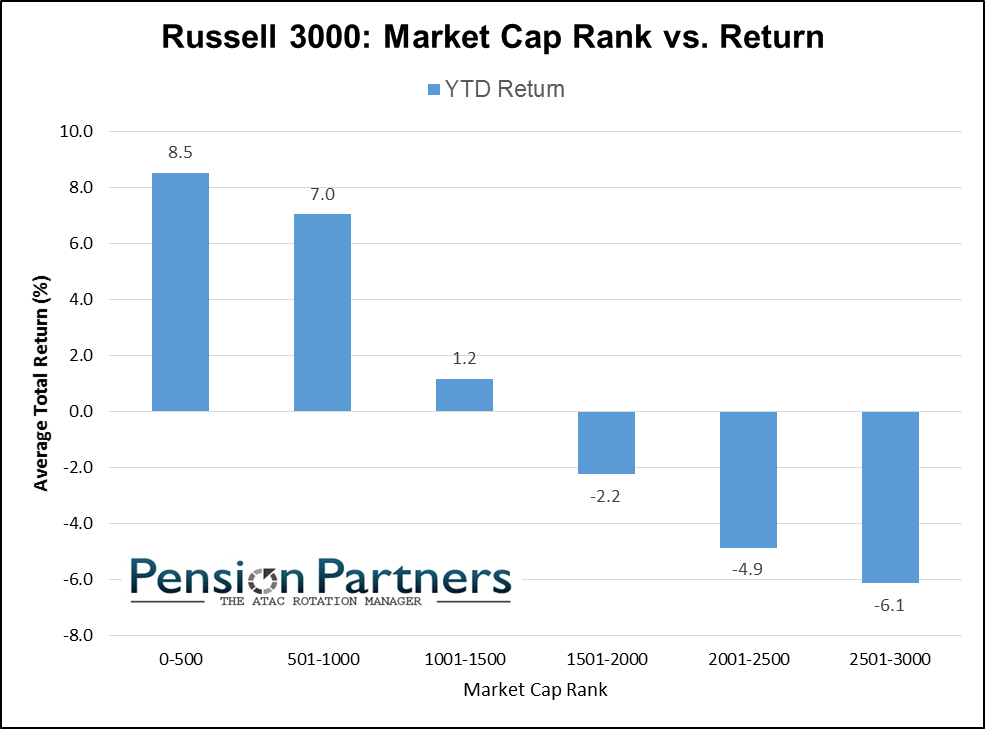Biggie Smalls
Courtesy of Joshua M Brown
Everyone is worried about the divergence between small caps and big caps. Everyone is talking about the split between the Russell 2000 and the S&P 500 as the former currently sports a year-to-date loss of roughly one percent while the latter continues to make new highs and spanks anyone who would dare attempt to call a market top.
In March and April, small caps dropped by 10 percent while the big caps of the S&P 500 held at all-time record highs, completely unfazed. It was the first time in recent history during which something like that had ever happened – and then small caps embarrassed the technicians by rocketing right back up to all-time highs from May through the first week of July. Anyone reading market internals felt like a chump for worrying about the small cap divergence and, god forbid you’d acted on it, you felt even worse. I fully cop to being one of those who had pointed this divergence out at the time.
But despite this rally back that drove everyone crazy, the small cap index (Russell 2000) never actually broke through to a new high.
And since peaking out just below the prior high at the beginning of this month, it’s quickly dropped almost 5%, almost in a straight line since. And because small cap stocks have tended to top out before the overall market during the majority of previous cycles, the worries about this divergence has come roaring right back again.
Charlie Bilello points out the huge disparity in performance between the big caps and small caps in a post at Pension Partners by telling us “The largest 500 stocks in the Russell 3000 are up an average of 8.5% this year, while the smallest 500 are down an average of -6.1%. There continues to be an uncanny relationship between a company’s market capitalization and year-to-date returns.” For now, he’s chalking this up to a mean reversion trade of sorts, as small caps have been outperforming the S&P 500 for fifteen years. He also notes that the valuation of the Russell on a price to earnings basis has led to a rotation as managers seek out the relative lower valuations in the mega-cap stocks.
His chart illustrates the phenomenon perfectly:
Over at Barron’s this weekend, the Streetwise column, penned by Ben Levisohn, looked at the same phenomenon and the possibility of it continuing:
the Russell 2000 already has fallen 1% year to date, even as the S&P has gained 7%. That sort of divergence hasn’t happened too often in modern times. The small-cap index has underperformed the S&P 500 in only two calendar years since 1999.
There are reasons, however, to think that this year might be the third. At a recent 1151.61, the Russell 2000 is trading for 26 times the next 12 months’ earnings estimates, well above the S&P’s price/earnings ratio of 16.6. That lofty premium might be worthwhile if small-company earnings were growing as rapidly as big-cap profits, but they aren’t. In fact, earnings for both the Russell 2000 and the S&P 500 are set to grow at an identical 6% clip in 2014. “Small-caps are expensive, yet their projected growth rates can’t justify the premiums,” says Sam Katzman, chief investment officer at Constellation Wealth Advisors.
The conlcusion here is that you’re paying a premium for small cap stocks but with no concomitant premium in earnings growth. Large caps are deemed the better buy – especially the really big ones that are multi-national and cyclical and have thus far been left in the dust by the averages.
The bigger concern to me, however, is not what to buy, big or small, but whether or not big can really hold up if small keeps tanking. It happened two months ago, but almost never before that. Are the watchers of market internals once again making a mountain of a molehill? Are our collective fingers too tightly gripping the tactical trigger given the length of the current bull?
When you’re searching for an excuse to call the end of a trend, you’ll probably end up finding one.
Sources:
THE SINGLE BEST PREDICTOR OF EQUITY RETURNS IN 2014? (Pension Partners)




